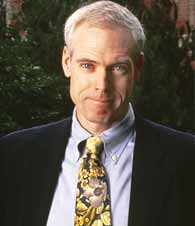|
Executive Interviews: Interview with Jim Collins on Level 5 Leadership
January 2008
 Jim Collins
Jim Collins Founder of Management Laboratory in Boulder, Colorado, 
-
Have you seen Level 5 leaders
become more prevalent since you
published Good to Great?
The Level 5 finding has begun to seep
into business school courses, driven
by faculty who believe in the research
base of our findings. I have also seen
increased confidence in those people
who tend toward a more Level 5 style
INTERVIEW 4
of leadership more humble, yet
determined and driven. Instead of
feeling that they need to try to become
one of the flamboyant leaders
celebrated in the media, our research
gives them confidence that they might
be on the right track after all. One of
|
|
the key contributions of our research
is to give those who have the right
natural instincts the confidence to
trust those instincts. -
Can people learn to become Level 5?
There are three categories of people:
those who could never become a
Level 5 leader, those who naturally
become a Level 5 leader from an early
age, and those who mature into Level
5 leadership. Of these three categories,
I suspect the largest group is the
third those who mature into Level 5
over the course of a career although
we would need rigorous research to
validate this hypothesis. Clearly,
though, we can see cases of people
who moved through all five stages in
their careers. -
Can you give an example of a leader
who matured into Level 5?
I believe that Lou Gerstner at IBM
moved from Level 1 to Level 5 through
his career, becoming Level 5 at IBM.
The key to Level 5 is one central
question: are you ambitious first and
foremost for the cause, the company,
the work not yourself and do you
have the will to make good on that
ambition& There is a wonderful line at
the end of Gerstners book Who Says
Elephants Cannot Dance? that goes
something like, along the way,
something happened something
that, quite frankly, surprised me. I fell
in love with IBM. At that moment, I
believe Gerstner made the leap to a
full fledged Level 5 leader ambitious
first and foremost for IBM, far beyond
himself. One of the key steps in
becoming Level 5 is to find work that
you care enough about to become
Level 5 in service to the cause of that
work. -
Youve said that the best leaders you
studied led with questions more than
with answers; can you explain?
Leading from good to great does not
mean coming up with the answers
and then motivating everyone to
follow your messianic vision. It means
having the humility to grasp the fact
that you do not yet understand
enough to have the answers and then
to ask the questions that will lead to
the best possible insights. The goodto-
great companies in our research
had a penchant for intense dialogue.
Phrases like loud debate, heated
discussions, and healthy conflict
peppered the articles and Interview
transcripts. They didnot use
discussion as a sham process to let
people have their say so that they
could buy in to a predetermined
decision. The process was more like a
heated scientific debate, with people
engaged in a search for the best
answers. You talk about the hedgehog
concept as the turning point from
good to great can a company have a
hedgehog concept that does not
involve becoming big?
The essence of a hedgehog concept is
to attain piercing clarity about how to
produce the best longterm results,
and then to exercise the relentless
discipline to say No, thank you to
opportunities that fail the hedgehog
test. When we examined the
hedgehog concepts of the good-togreat
companies, we found they
reflected deep understanding of three
intersecting circles:
- What you are deeply passionate
about
- What you can be the best in the
world at, and
- What best drives your economic
engine.
The key for any business that wants to
compete is to think hard about the
answer to these three questions
within a local community. Great does
not equal big and big does not equal
great you can have a highly
localized hedgehog and be very
successful.
1.
Leadership and Entrepreneurship Case Studies
2. ICMR
Case Collection
3.
Case Study Volumes
|
